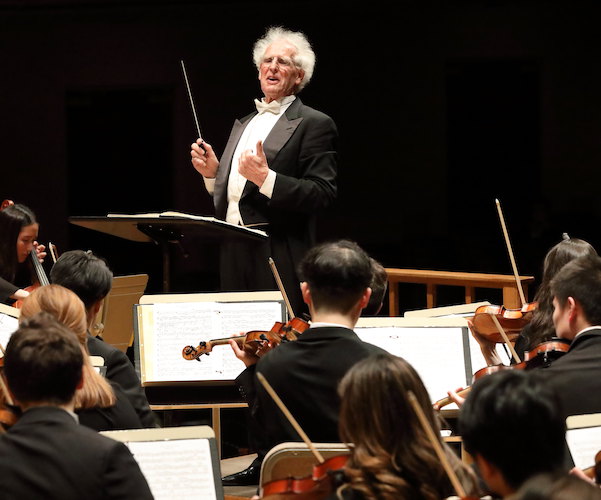Concert Review: Boston Philharmonic Youth Orchestra plays Stravinsky and Berlioz
By Jonathan Blumhofer
Desperate times, desperate measures.

Benjamin Zander conducting the Boston Philharmonic Youth Orchestra at Symphony Hall. Photo: Hilary Scott.
With coronavirus restrictions falling into place throughout New England, the Boston Philharmonic Youth Orchestra (BPYO) took the stage last Thursday night for what may well be the last orchestral concert in Boston of the 2019-20 season. Their Symphony Hall program, led by Benjamin Zander, paired two great orchestral showpieces, Igor Stravinsky’s 1911 ballet Petrushka and Hector Berlioz’s 1830 Symphonie fantastique.
Like most works of similar scope, both pieces are best experienced live. But, a few hours before the downbeat, the concert was closed to all but a small audience of family and friends; the rest of us could only hear it via a live-stream link.
Especially given the circumstances, this was a wise move, though, as can be seen/heard, the streamed-listening experience wasn’t quite perfect acoustically (no set of speakers can replicate Symphony Hall) or technically (thanks to a copyright issue, the feed cut out in the middle of Petrushka’s third tableau).
Still, most of what came across was impressive and vibrant.
The BPYO was in particularly fine fettle in Berlioz’s harrowing “dramatic symphony.” Inspired by the composer’s obsession with the actress Harriett Smithson, the Symphonie famously depicts a love-addled artist on an opium trip that culminates with him murdering his beloved and being tormented by her (and a coven of witches) in hell.
Thursday’s performance captured its ardent twists and turns vigorously. Tempos in the opening “Visions and Passions” were flexible, dynamics carefully balanced, and textures – even at the busy apex of the movement’s recapitulation – lucid.
The waltz shimmered and lilted uneasily.
In the central “In the Country,” the oboe/English horn duet was gorgeously articulated. Here (as in the first movement), Zander’s feel for the music’s sense of space and shape was beautifully realized. Berlioz’s atmospheric touches – from the spare, delicate melodic lines at the beginning to the rumble of distant thunder at the end – spoke with immediacy. The movement’s rhythmic momentum never lagged. Indeed, there was a rhapsodic quality to this interpretation that fit the music perfectly.
More mighty dynamic contrasts as well as stately brass playing marked the “March to the Scaffold,” while the concluding “Dream of a Witches’ Sabbath” offered a lively play of tonal chiaroscuro, particularly in the crowning fusion of the “Dies irae” chant and “Witches’ Round Dance.”
Similar qualities marked the BPYO’s account of Petrushka that came before intermission (or, at least, the half of it that made it over the airwaves).
The opening tableau was bright toned and brawny, well balanced, and highlighted by a series of top-drawer solos from the ensemble’s principal flute, oboe, clarinet, violin, and piano.
In the second, raw brass outbursts alternated with full-bodied woodwind ensemble work. And the third brimmed with exotic character, as well as some terrific trumpet playing from principal Mark Macha (the performance abruptly cut out during his mid-movement solo).
Perhaps that was apt, given how this pandemic has suddenly and thoroughly upended our day-to-day routines.
Zander spoke to the uncertainty of the moment in some comments following the Berlioz, after which he led the BPYO in “Nimrod” from Elgar’s Enigma Variations. That piece is a BPYO staple; even so, given the present context, Thursday’s reading was conspicuous for its poignant air.
Jonathan Blumhofer is a composer and violist who has been active in the greater Boston area since 2004. His music has received numerous awards and been performed by various ensembles, including the American Composers Orchestra, Kiev Philharmonic, Camerata Chicago, Xanthos Ensemble, and Juventas New Music Group. Since receiving his doctorate from Boston University in 2010, Jon has taught at Clark University, Worcester Polytechnic Institute, and online for the University of Phoenix, in addition to writing music criticism for the Worcester Telegram & Gazette.
